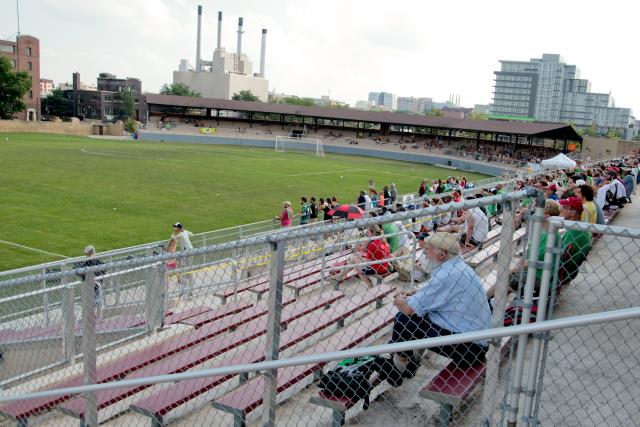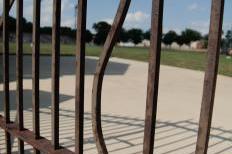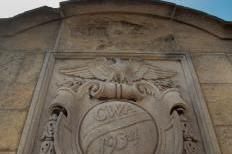






 Fans watch the Madison Radicals ultimate frisbee team play at Breese Stevens Field (Kait Vosswinkel/Madison Commons)
Fans watch the Madison Radicals ultimate frisbee team play at Breese Stevens Field (Kait Vosswinkel/Madison Commons)
Behind the stone walls on East Washington Avenue lies a home for soccer, ultimate Frisbee, Shakespearean drama and almost 90 years of history.
Breese Stevens Field, originally constructed in the 1920s, is named after a former Madison mayor who served in the late 1800s.
Over the years, Tom Tierman, who oversees maintenance of the field, said the stadium has hosted events ranging from baseball and football to wrestling and midget-car racing (small cars with four-cylinder engines, with races still going on at Angell Park Speedway in Sun Prairie), with many others in between.
"[The history] is what keeps me going here," Tierman said.
The stadium's long history is illustrated throughout the stadium, whether it's the original stone walls built in 1934, old tiles underneath the bleachers from the former bar area or the bent steel bars on the entrance gate at East Washington Avenue and Paterson Street. Tierman said the bars were bent during a strongman competition as part of a wrestling event decades earlier.
Origins and history
The land for the stadium was purchased by the city from Breese Stevens' widow in 1923, and architects for the structure were hired two years later to design the new field. The stone walls still surrounding the stadium went up in 1934, when lights were also installed, making it the only outdoor venue in Madison with lights for years to come.
Breese Stevens continued as the premier stadium in Madison until the 1960s, when more modern stadiums popped up and took teams and events with them, especially the high school teams.
However, the field still hosted its share of competitions, including the Punt, Pass and Kick competition in October 1970. Today, those competitions often take place at NFL stadiums.
 Bars on a gate a Breese Stevens Field were bent went the stadium hosted a Strongman competition (Kait Vosswinkel/Madison Commons)
Bars on a gate a Breese Stevens Field were bent went the stadium hosted a Strongman competition (Kait Vosswinkel/Madison Commons)
As an additional attraction, the city authorized the sale of alcoholic beverages by city employees in 1971, which paved the way for the bar formerly located under the bleachers nearest to East Washington Avenue, though it is now closed and demolished.
And while Warner Park construction was finishing in the early 1980s, the stadium briefly hosted the Madison Muskies, a minor league baseball team.
Today
Breese Stevens still serves as the home field for the Madison 56ers semi-pro men's and women's soccer teams, Edgewood College's soccer teams, Edgewood High School's soccer team and the Madison Radicals, a professional ultimate Frisbee team.
Radicals owner, coach and player Tim DeByl said he first thought of using Breese Stevens when working across the street in a third floor office and seeing the "great stadium" that was not being used regularly. After approaching the city and initially facing opposition to using the stadium for anything other than soccer, the city eventually came around.
"That day that we actually managed to get the stadium I was pretty happy," he said. "It really feels like a cool place to play."
Since the season began, DeByl said it seems to be one of the better stadiums in the league, even with it's age approaching ninety. Teams playing at the stadium dress in old locker rooms consisting of four benches, showers, a bathroom and a chalkboard, while cages where live mascots were once housed lie empty.
"Some people have said that the locker rooms are a drawback, but I love them," he said. "For me I think it fits in with what people think about Frisbee: ultimate as sort of being an alternative yet old school sport."
He also said the stone walls surrounding the stadium create an atmosphere that other teams' high school or college stadiums cannot duplicate.
Shakespeare in the stadium
While the field has hosted a large range of sporting events, just one year ago it began to host Shakespearean plays.
The Madison Shakespeare Company began when Warren Hansen, who helped to found it, was having lunch The exterior walls of Breese Stevens Fields went up in 1934 (Kait Vosswinkel/Madison Commons) with Steve Cover, the city of Madison director of Planning and Community and Economic Development, who suggested more outdoor theater in the city. Specifically, he mentioned Breese Stevens.
The exterior walls of Breese Stevens Fields went up in 1934 (Kait Vosswinkel/Madison Commons) with Steve Cover, the city of Madison director of Planning and Community and Economic Development, who suggested more outdoor theater in the city. Specifically, he mentioned Breese Stevens.
Hansen loved the idea, and, along with co-founder John Varda, created the company to begin performing in 2012.
Performing outdoors, especially so close to a major street, can present a challenge to performers, as the company dealt with last year.
"There was a moment when a whole flotilla of motorcycles went down East Washington, and the guys on stage just [froze] until they were gone," Hansen said. "There's going to be street noise and everybody has to know that's going to happen or they'll find out it's going to happen, so it's not the end of the world."
While performing in a stadium designed for sporting events presents other obstacles, including oftentimes long stage entrances and dressing in locker rooms not designed for theater, Hansen said the "atmosphere is always there" when performing.
"Now it has a second use," he said. "I'm glad Steve had that idea."
The Shakespeare group will hold five performances of Antony and Cleopatra from July 24 to July 28, with tickets on sale online for $10 at madisonshakespeare.org. Performances will start at 6:30 p.m.
Looking Ahead
Breese Stevens may see another revolutionary change soon, with discussion of putting in astroturf instead of grass, which Tierman said he hopes would attract more teams to bring their events to the stadium because of the newer surface.
Madison East Parks General Supervisor Craig Klinke said the stadium and its history have been passed down through generations of Madison residents, and that as it continue to be used, more and more people realize "what a gem is located right in their neighborhood."
"Even folks who have never been there before are always impressed and amazed that such a facility exists right off East Washington Ave," he said. "It's a tradition that gets passed on from generation to generation and it draws new people to it once they realize what is there."
|
|
|
Welcome to the Madison Commons, a website designed to provide news and information about all of Madison's neighborhoods and a crossroads for the discussion of community issues. The name comes from the idea of a village commons, a place for news, talk, debate, and some entertainment, too, that's open to everyone.
All rights reserved. Read more about the Madison Commons and its partners.

